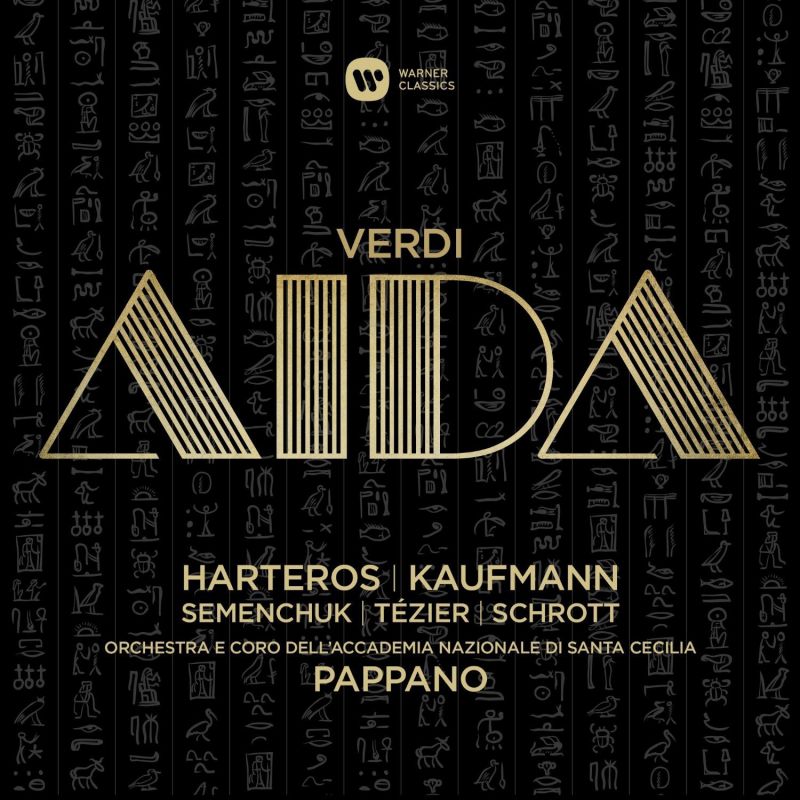VERDI Aida
View record and artist detailsRecord and Artist Details
Composer or Director: Giuseppe Verdi
Genre:
Opera
Label: Warner Classics
Magazine Review Date: AW2015
Media Format: CD or Download
Media Runtime: 146
Mastering:
DDD
Catalogue Number: 2564 61066-3

Tracks:
| Composition | Artist Credit |
|---|---|
| Aida |
Giuseppe Verdi, Composer
Anja Harteros, Aida, Soprano Antonio Pappano, Conductor Ekaterina Semenchuk, Amneris, Mezzo soprano Eleonora Buratto, Priestess, Soprano Erwin Schrott, Ramfis, Bass-baritone Giuseppe Verdi, Composer Jonas Kaufmann, Aida, Tenor Ludovic Tézier, Amonasro, Baritone Marco Spotti, King of Egypt, Bass Paolo Fanale, Messenger, Tenor Santa Cecilia Academy Chorus, Rome Santa Cecilia Academy Orchestra, Rome |
Author: Richard Osborne
Aida received its first complete studio recording in Rome in 1928 but it was the 1959 Decca recording – produced in Vienna by John Culshaw with Karajan conducting a largely Italian cast – that finally gave us what Andrew Porter, writing in these columns, called ‘a sound realisation of the score which transcends any shortcomings inherent in physical staging and brings us a step closer to that ideal imagined performance’. Not that the Decca set displaced the theatrically thrilling, albeit more conventionally produced, 1955 Serafin recording with Maria Callas as Aida and Tito Gobbi as a near definitive Amonasro.
The new recording, produced by Stephen Johns, stands within that broad EMI tradition, albeit with a larger stage picture and a greatly enhanced dynamic range beautifully accommodated to the opera’s need, and the listener’s. Where the new set resembles the 1959 Decca is in the quality of the conducting. Pappano’s direction, like Karajan’s, is organic as the work is organic: each episode finely shaped within itself (the Triumphal Scene is beautifully judged) yet built unerringly into the larger whole. I don’t hear this to the same extent in Muti’s 1974 EMI recording and certainly not in the 1961 RCA set, where a strong cast headed by Leontyne Price and Jon Vickers has to do battle with Solti’s brazen and occasionally thoughtless conducting.
Karajan has the Vienna Philharmonic but it is arguable that Pappano goes one better, with orchestral playing of rare accomplishment from an Italian ensemble which is alive to the opera’s every word. (And motion: the ballet sequences are superbly realised.) In both performances the orchestra is a powerful additional player which supports the singers at every turn. The result is a vocally lyrical Aida with Pappano’s cast, like Karajan’s, never needing to force the moment. We hear this at the very outset in Jonas Kaufmann’s account of ‘Celeste Aida’, less visceral than some but wonderfully mellifluous and crowned by a rarely heard quietly diminishing high B flat.
Anja Harteros is arguably the most interesting Aida on record since Callas, albeit differently characterised. Where Callas is every inch the lovelorn warrior princess, Harteros is a humane and articulate Aida who is palpably not the mistress of her destiny. Her top C near the end of ‘O patria mia’ is neither as pianissimo nor as dolce as Caballé’s on the Muti recording, but that – for all but the most ardent canary-fancier – is beside the point when Caballé lacks the power persistently to outface Fiorenza Cossotto’s dauntless Amneris and is never as at one with her Radamès, Plácido Domingo, as Harteros is with the leonine yet liquid-toned Kaufmann.
It matters little in an intelligently produced studio recording that of the principals only Ekaterina Semenchuk has sung her role on stage, though her Amneris is indeed one of the finest on record. Ludovic Tézier is an impressive Amonasro. Apart from an indistinct final syllable on ‘Ei t’ama’ as Amonasro confronts his daughter with the fact of Radamès’s love for her, he is a consistently strong player. Marco Spotti makes a plausible King, but Erwin Schrott’s High Priest sounds too benign to be the regime’s political enforcer.
Pappano has already given us an exceptional recording of the Messa da Requiem (EMI, 10/09), which Verdi wrote shortly after Aida. The concentrated quiet of the choral work in the temple scenes, where Eleonora Buratto contributes an exquisite High Priestess, echoes this. In the trial scene and the lovers’ entombment, the new recording perhaps deploys too few tricks. I rather miss Culshaw’s contrived but subtly layered acoustic picture; and prefer hieratic brass which is palpably nel sotterraneo as Verdi directs. (The 1955 Serafin recording has this exactly right.) But the singing of the doomed lovers has tenderness and beauty, and the preternaturally quiet Santa Cecilia string-playing is exquisitely managed as the drama makes its longed-for tryst with silence.
No recording is without the occasional oddity of balance and perspective. And Warner’s booklet is poor, preferring a PR puff to an essay on the opera itself. But these are minor matters in the presence of what is as fine an all-round Aida as the gramophone has yet given us.
Discover the world's largest classical music catalogue with Presto Music.

Gramophone Digital Club
- Digital Edition
- Digital Archive
- Reviews Database
- Full website access
From £8.75 / month
Subscribe
Gramophone Full Club
- Print Edition
- Digital Edition
- Digital Archive
- Reviews Database
- Full website access
From £11.00 / month
Subscribe
If you are a library, university or other organisation that would be interested in an institutional subscription to Gramophone please click here for further information.




